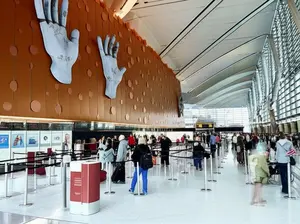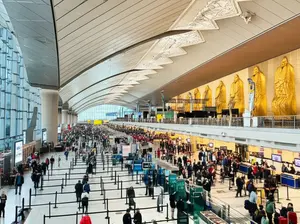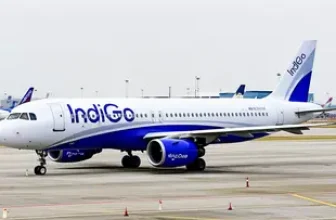
In a significant disruption to travel plans, at least 60 domestic flights were cancelled at Delhi’s Indira Gandhi International Airport on Saturday. This operational setback comes amidst a backdrop of escalating military tensions between India and Pakistan, prompting authorities to implement enhanced security measures across the sector.
According to informed sources, a balanced mix of both departures and arrivals was affected, with 30 flights each being axed between 5:00 AM and 2:30 PM. This follows a larger wave of cancellations on Friday, where 138 flights were grounded, raising concerns among passengers and airlines alike.
The situation has escalated due to an increase in military hostilities, particularly impacting air travel in northern and western regions of India. In response, 32 airports, including key locations such as Srinagar and Amritsar, have been temporarily closed for civilian operations, further complicating travel plans for thousands.
Delhi International Airport Ltd (DIAL), which manages operations at Indira Gandhi International Airport, assured travelers that airport operations continue as usual, although flight schedules could see further impacts due to evolving airspace conditions and security measures mandated by the Bureau of Civil Aviation Security.
In a statement posted on social media platform X, DIAL advised passengers to arrive at the airport earlier than usual. The recommendation comes amid expectations of prolonged security processing times as personnel exercise additional caution at checkpoints. The airport has urged travelers to cooperate fully with both airline and security staff to ensure a smooth facilitation process during this period of heightened alert.
This scenario highlights how swiftly geopolitical tensions can influence civilian sectors, particularly travel and commerce. As military operations escalate, the aviation industry is often one of the first to feel the ripple effects. Not only do flight cancellations create immediate inconveniences, but they also invoke broader economic repercussions as airports depend on passenger traffic for revenue.
One notable aspect of this situation is the regional response to these developments, including increased scrutiny of air travel protocols. Passengers flying domestically between various Indian cities may need to prepare for ongoing disruptions in the coming days. With more airports being closed to civilian flights, the options available for travelers to move rapidly are diminishing.
It is a precarious time for many air travelers, particularly as they navigate the unpredictability that often accompanies heightened military engagement. Even in such tense atmospheres, the ability of airports to maintain operational integrity while prioritizing passenger safety is crucial.
As the military conflict continues to unfold, the hope is for a resolution that brings stability back to the region and restores normalcy to flight operations. In the meantime, travelers are encouraged to remain updated on flight statuses and security measures while preparing for potential delays and cancellations.
Given this fraught scenario, the reliance on air travel during uncertain times presents both challenges and logistical strain on the industry. With both airlines and passengers navigating the hurdles of flight cancellations, the overall impact on passenger confidence could manifest in the long term, affecting both travel habits and economic throughput.
As India grapples with this challenging phase, it is essential for the government and airlines to communicate transparently about flight operations and safety protocols. Ensuring that travelers are kept in the loop during such turbulent times will be vital not only for immediate management but also for securing the travel industry’s resilient recovery in the months ahead.






